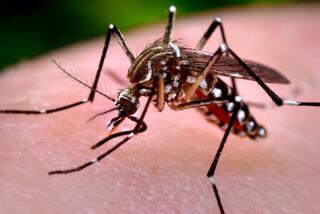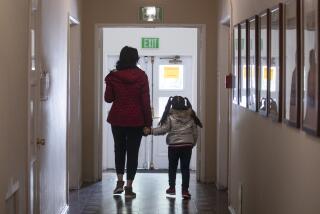Lack of Funds May Force Cutoff of Free AIDS Tests : Health: State outlay will be reduced, although Long Beach has one of California’s highest per-capita rates of the disease.
LONG BEACH — Long Beach health officials, faced with cutbacks in state funding of AIDS tests, warned this week that free tests for the deadly disease may be cut off in a few months.
Beginning Friday, the state will reduce its funding of free, anonymous testing for the virus that causes AIDS from $44 to $35 per test. Each test costs the Long Beach Health Department $50 to $60, officials said.
The state has already limited the total payment for testing in Long Beach in the 1992-93 fiscal year to $350,000, down from $689,000 the previous year.
The cutbacks have left health officials in Long Beach scrambling for ways to provide testing for HIV, the human immunodeficiency virus, through July 1, when a new fiscal year begins.
Unless new funds are found, the Long Beach Health Department expects to run out of money by April or May, said Michael Johnson, the AIDS program officer. And officials at The Center, a gay and lesbian service facility that subcontracts with the Health Department to do HIV testing, said their state money may be gone as early as February.
“It is absolutely creating panic,” said Wayne Trevathan, executive director of The Center.
“It’s a strange sense of priority when we cut out funding for testing of an infection that is continuing to grow and is a deadly virus.”
Long Beach health officials have already reduced the number of counselors from three to two, started charging $10 for confidential tests that have been free and eliminated HIV testing at Cal State Long Beach, Johnson said.
Although the department charges for confidential tests, it continues to provide free anonymous testing, which is the preferred method for a majority of the people taking the HIV test, officials said.
In Long Beach, 1,418 AIDS cases have been reported since 1985. The city has the second-highest number of cases per capita in California, second to San Francisco, officials said.
In the 1991-92 fiscal year, the number of people taking the test in Long Beach jumped from about 7,000 to 15,000, Johnson said. Officials attribute the increase to a statewide information campaign and Laker basketball star Earvin (Magic) Johnson’s disclosure that he tested positive for the virus that causes acquired immune deficiency syndrome.
To meet the increased demand throughout California, the state AIDS office agreed during 1991-92 to reimburse for all tests, even if the total amount went above its usual allocation. In Long Beach, the state gave the Health Department $689,000 instead of its allotted $350,000, Johnson said.
But this fiscal year, state officials said they don’t have the money to meet the increased demand. For Long Beach, the contribution from the state remains at $350,000 annually, despite the increase in the number of people requesting HIV testing.
Last fiscal year, AIDS testing cost the state $16 million, and this year it will cost $12 million.
“The state of California cannot afford to provide every resident with a test, sometimes two or three times a year,” said Anna Ramirez, chief of the education and prevention services branch of the state AIDS office.
“This service was originally designed for testing high-risk individuals,” Ramirez said. “But this program has grown into a testing program for every individual.”
Ramirez argued that many of the people seeking the free tests could bill the fee to their insurance companies. Many activists argue, however, that people do not report HIV tests to their insurance companies for fear of having their policies canceled. In those cases, Ramirez said, people should pay for the tests themselves.
“You can’t tell me 272,000 people (tested in California last year) don’t have the ability to pay,” Ramirez said. “They should pay $35 out of their pockets to find out. It’s not an exorbitant amount.”
AIDS activists argue that early intervention prolongs lives, helps prevent unsafe sexual practices and reduces costs in the long run.
“We don’t just give them a test. We educate them about AIDS, show them a film and provide them with counseling,” said Dr. Kelly V. Butler, director of the HIV-antibody testing program at The Center. “If they’re negative, we want to make sure they stay that way.”
About 2% of the people who take the HIV test in Long Beach are positive, Johnson said. About 9% of the AIDS cases in Los Angeles County are from Long Beach, he said.
Butler said he hopes that the Clinton Administration will infuse federal money into AIDS programs and services. The current Administration has slashed millions of dollars in AIDS prevention grants that had been available to the states.
“People need to know that come spring or summer, we may not be able to get HIV testing for them,” Butler said.
More to Read
Sign up for Essential California
The most important California stories and recommendations in your inbox every morning.
You may occasionally receive promotional content from the Los Angeles Times.









